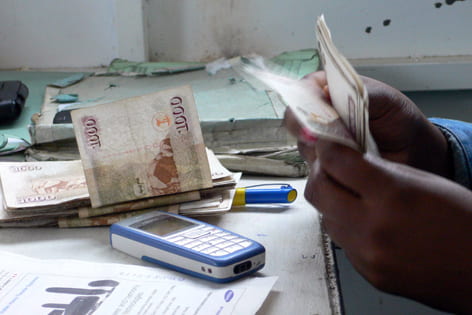The future of money: A glossary
Digital money or currency – a broad term describing any technology providing access to or even replacing traditional functions of money – is not limited to developing countries.

Digital money or currency – a broad term describing any technology providing access to or even replacing traditional functions of money – is not limited to developing countries.
In Japan, for example, public transit users simply wave computer chip-embedded smart cards at railway turnstiles, speeding their daily commute in the process. And in Korea, use of smart cards, e-cash and other technology to pay for goods and services is growing. But, most Americans haven’t been quick to jump into the digital money arena.
“In the U.S., some people have reacted with suspicion toward new financial technologies, mainly because they fear a loss of privacy or “big brother” monitoring their spending habits,” anthropologist Bill Maurer says. In fact, some people refer to identification chips used in Japanese transit cards as “spy chips.”
Want to catch up? Here’s a look at forms of digital currency and alternative payment methods used all over the world.
- Contactless smart cards: Smart cards use chip technology to communicate with card readers rather than direct contact between them. Many public transit cards are contactless smart cards: a passenger can touch or wave the card over the turnstile to gain entry.
- E-cash: Digital money that emulates properties of physical cash such as anonymous exchange. Public transit smart cards, such as Suica (Tokyo), Octopus (Hong Kong) and Oyster (London), can be used as e-cash when anonymity is preserved by not registering the card with a central authority.
- Mobile banking, m-banking, m-payments: Mobile device-based applications for checking bank balances, making payments or transferring funds. Applications are being developed for sending, receiving and storing value directly in a device.
- POS terminal: Wireless point-of-sale terminals allow people with no access to brick-and-mortar banks to make deposits, withdrawals, payments, etc.
- Smart cards: The general term for any card with a specialized computer chip embedded, allowing it to process transactions more elaborately and securely than magnetic strip cards.
- Stored value card: A payment card in which digital money has been encoded either directly or as a link to an account to be debited when payment is made. Most gift cards are stored value cards.
- Virtual currency: A form of money used in an online virtual world, such as “Linden Dollars” in Linden Lab’s Second Life or “gold pieces” in Blizzard Entertainment’s World of Warcraft.


